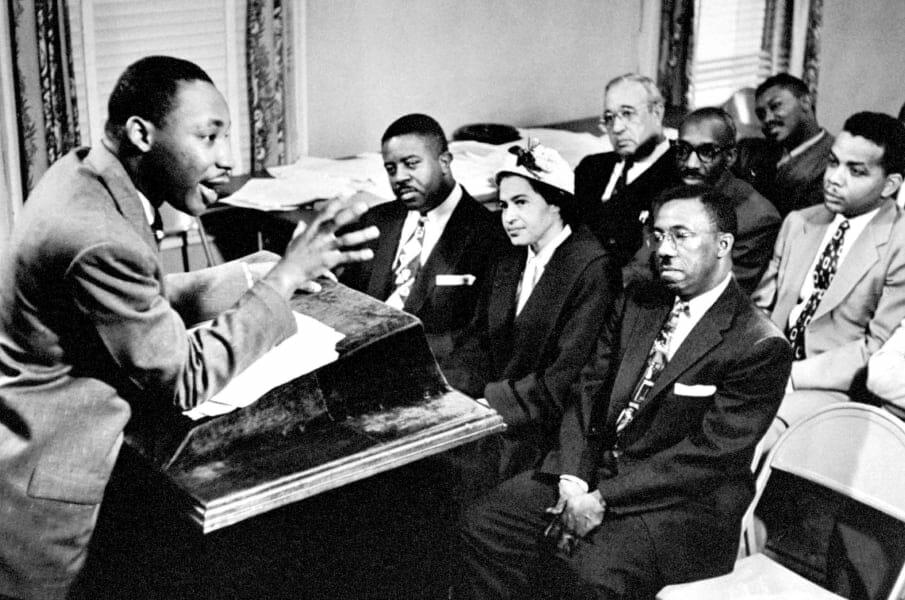
The risky dream of leadership

Rev. Margaret Marcuson
January 17, 2020
Martin Luther King wasn’t afraid to stand up and stand out. Christian leaders sometimes get caught in saying to people, “Where do you want to go, and I’ll lead you there.” They are afraid to take a stand, or they don’t think it’s part of their job.
Of course, there’s a place for listening and gathering the wisdom of the group. It’s a critical part of leadership. Yet like King, leaders need to be willing to take a risk and define themselves to those they lead: “Here’s what I believe. Here’s where I stand. Here’s where I’m heading.” Those you are leading need and want to hear from you.
Like Martin Luther King, leaders need to be willing to take a risk and define themselves to those they lead: “Here’s what I believe. Here’s where I stand. Here’s where I’m heading.”
Taking a stand in this way is not telling people what to do or trying to coerce them into seeing things the same way you do. King’s “I Have a Dream” speech (is a powerful example of this kind of self-defined leadership. (Here’s a link to the full audio of the speech, and here’s the official text.)
If you listen to the speech again, you’ll notice King doesn’t say “you ought” or “you should.” He does speak words of encouragement to those who are tired in the struggle for freedom. But the most powerful part of the speech is when he simply lays out, in vivid detail, the quality of his dream, with the powerful preacher’s refrain simply repeating again and again “I have a dream today.” He paints a picture for people so compelling that it is still alive today nearly 60 years later. We listen to the speech, and we want that dream, too. We know we’re not there yet, and we want to keep going toward the dream.
Recently, a pastor I’m coaching shared something clear and powerful about a dream he has for his ministry setting. I asked, “Have you said that to your people?” He said, “No, not really.” I encouraged him to find a way to share it with them.
Sharing your dream doesn’t mean telling people what they ought to be or do. Instead, it means you are clear with them about what’s most important to you as you create a picture of the dream, as King does in the speech. People need to be able to see the picture to enter into the dream with you.
It’s not selfish to share your dream. It’s a gift to them, to help them imagine something different. It’s an invitation to join with you in creating something new. That’s leadership.
Timing matters in sharing your dream. King had been working for racial justice for years when he gave that speech. He knew the territory well. In church life, sometimes new pastors are pressured to “cast a vision” when they haven’t been in the congregation long enough to know what an appropriate vision for that congregation would be. If you’re new to your setting, take your time. Connect and listen before you speak about vision.
Leaders can find it lonely to share their dream. It’s frightening. You are vulnerable when you take a stand like this. Even the most powerful and compelling stand doesn’t mean that everyone will rise to their feet and cheer. There are real risks, as Martin Luther King’s story clearly shows. Sharing your dream means you run the real risk that someone will say, “That’s crazy.”
People may say, “I hate it,” or “That’s not how we do things here.” Most leaders don’t risk their lives when they take a stand, but sometimes they risk their jobs. At the very least, they have to deal with the fallout from those who resist.
In fact, if no one tells you you’re crazy or at least off-track, you probably haven’t run a big enough risk. And when they do say it, you can take it as a sign you are on the right track. Of course, if no one is following you aren’t leading. But if everyone cheers you, you probably haven’t gone far enough to move forward.
Here’s the biggest leadership challenge: don’t get reactive to those who react negatively to your dream. Listen, don’t try to convince them otherwise, and be sure to stay in relationship with them. Over time, keep sharing your dream, little by little. It won’t happen overnight.
No dreams are guaranteed. But persistent, calm, imaginative leaders make a difference.
What is your dream? You can’t share it if you don’t know. Start this year by listening to King’s speech, then taking ten minutes to write about your dream. Then share it with at least one other person.
The Rev. Margaret Marcuson helps ministers do their work without wearing out or burning out, through ministry coaching, presentations and online resources.
The views expressed are those of the author and not necessarily those of American Baptist Home Mission Societies.


